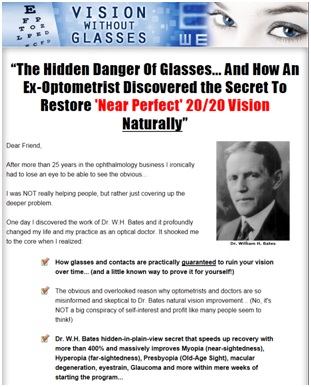By Brian Chou, OD,  FAAO
FAAO
Herbal remedies, cheap prescription drugs, baldness cures, male enhancement drugs, weight loss remedies and anti-wrinkle creams – what do these bring to mind? E-mail spam! More than 70 percent of e-mail traffic is spam according to a recent analysis, of which health issues are a common topic.
False eye health and vision improvement advertising to consumers is a particular concern of mine. Approximately 15 years ago, my efforts to fight consumer advertisements containing false eye health claims led the Ohio Attorney General’s Office and Federal Trade Commission to investigate the publisher of “Hidden Secrets to Better Vision,” a book that recommended unsafe and unproven eye treatment. Fischer Publishing Corp. closed shortly thereafter.
Most consumers probably don’t get much spam related to eyecare. But I recently received two such unsolicited e-mails intended for consumers, one with the subject heading, “20/20 restored: Cost-free Consultation” and the second, “Ophthalmology Report: Natural Sight Restoration.”
The former spam e-mail read: “Your vision can be corrected without surgery or glasses. Thanks to the research of a renowned ophthalmologist, your sight can be corrected naturally. If you want to reverse Myopia, Hyperopia and other serious conditions…And at the same time fix your eyesight without harmful surgery, visit us.”
The latter spam read: “You don’t need to continue suffering from poor vision. How much joy has poor eyesight robbed from you? Do you ever have to say no to activities you would love to take part in? If your answer is yes, how much more are you willing to miss out on? We offer a free evaluation and there’s a limited time 20% off special right now*. Give us a quick visit for the details*. What do you have to loose[sic]?”
 Both spam e-mails directed to this web site: www.visionwithoutglasses.com (see photo to the left) which espouses a variation on Bates eye exercises, a scientifically debunked method of vision correction. While the vast majority of recipients should recognize these e-mails are unwanted junk, the reality is that the miniscule number opening these e-mails and purchasing the product is still enough to sustain and encourage this endeavor. P.T. Barnum was right that there is a sucker born every minute. Still, those believing this spam are arguably getting what they deserve.
Both spam e-mails directed to this web site: www.visionwithoutglasses.com (see photo to the left) which espouses a variation on Bates eye exercises, a scientifically debunked method of vision correction. While the vast majority of recipients should recognize these e-mails are unwanted junk, the reality is that the miniscule number opening these e-mails and purchasing the product is still enough to sustain and encourage this endeavor. P.T. Barnum was right that there is a sucker born every minute. Still, those believing this spam are arguably getting what they deserve.
I believe what is more relevant is whether this spam reflects the subconscious of the populace and, second, if it can also influence it. The aforementioned business preys on the popular belief that using corrective eyewear is inherently bad and can harm the eyes. At the same time, it may be further elevating this oft-unstated consumer concern. Never mind the fact that there is no evidence-based support that corrective eyewear causes eye disease, nor exacerbates the need for refractive correction. This exemplifies the unfortunate aspect of how electronic media can amplify the voice of those who shouldn’t hold this privilege.
Meanwhile, the irony is that the collective effect of eye-related spamming may have a greater impact on our profession, albeit a negative one, than an expensive industry-endorsed campaign, like Think About Your Eyes. Like it or not, the new reality is that eye doctors are no longer the trusted, sole source of eyecare information of yesteryear. To be sure, today consumers should hold a healthy level of skepticism with any professional because of the pariahs. Aside from these outliers, the voice of eyecare professionals is now cluttered by the increasing volume of detritus from these marketers.
Brian Chou, OD, FAAO, is a partner with EyeLux Optometry in San Diego, Calif. To contact him: chou@refractivesource.com.

























